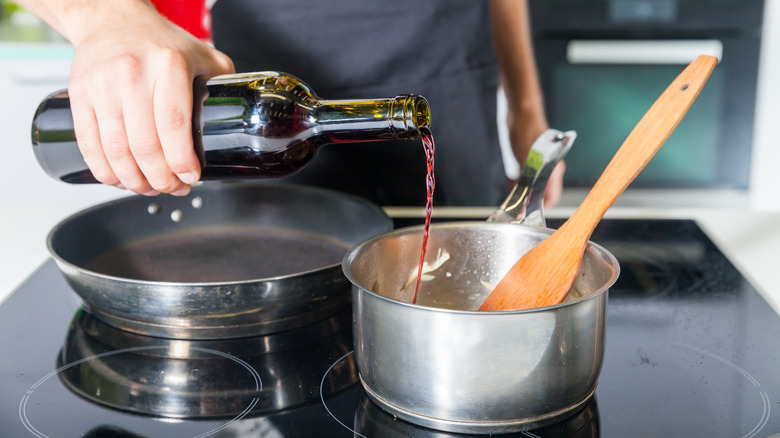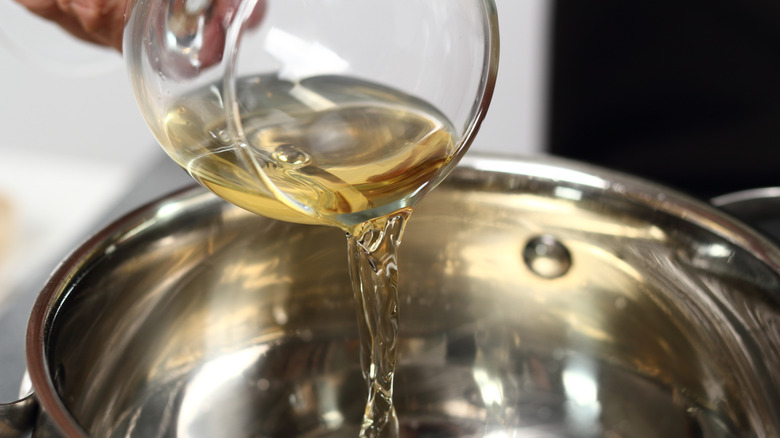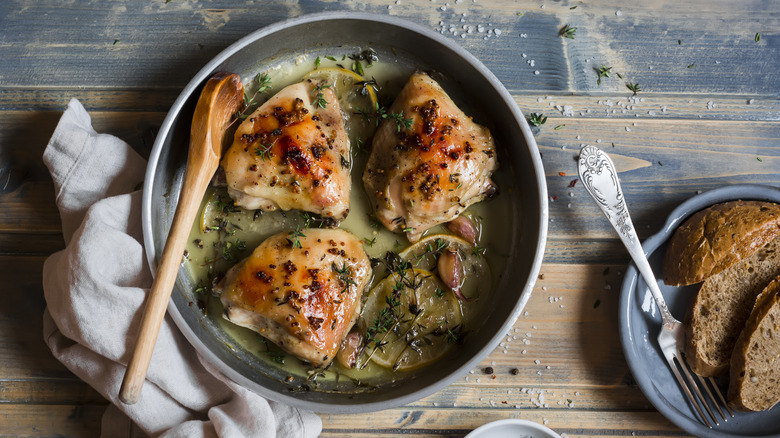The Extra Step You Need For More Delicious Wine Sauce Every Time
Rich and well-rounded, a good wine sauce instantly improves so many dishes. It's the basis of hearty slow-cooked recipes such as coq au vin or braised short ribs, but it's also great when served on the side to a simple grilled steak or roasted meat, adding a complexity to the finished dish.
The ingredients of a basic wine sauce are pretty straightforward. It's mostly made up of wine, beef or chicken stock, butter, and often aromatics, like shallots. With such a short ingredients list, technique is what's especially important. To get the most flavor and depth, there's one step that you absolutely can't skip, and that's reducing the wine before you start making the sauce. Learning how to make a reduction out of your red or white wine is an easy way to get restaurant-quality results at home.
Reducing the wine means simmering it in a pan until its volume decreases, ideally to around a third of its original amount. It makes the wine thicker and more viscous, giving a better consistency to the sauce that avoids a runny or watery result. It also helps the flavor of the wine come through by making it more concentrated, which means the finished sauce is more intense. You don't have to worry about winding up with wine soup, so long as you reduce it first — it's the key for the most smooth and rich sauce possible.
Reducing wine creates a smoother, better flavor
Reducing wine can soften the harsh taste of alcohol, which can be unpleasant and overshadow your other flavorings, while also concentrating the flavors in the wine itself. The best way to reduce wine is in a small saucepan over medium-high heat. Try to reduce it to a third of the initial volume, which will take around five to seven minutes for one cup of wine. Then, add a cup of stock and reduce the mixture for the same amount of time again, before whisking in a little room temperature butter for a silkier finish.
Be careful not to reduce the wine for too long, as it can take on bitter notes as its sugars start to burn. If your sauce still ends up watery, try small amounts of thickeners like cornstarch, rather than simmering your wine until it takes on an acrid edge. And don't add cold butter to finish your sauce, as the temperature shock can cause the warm sauce to split.
When wine is reduced, it ends up with a lower alcohol content. But if you don't want to consume alcohol at all, it's worth noting that not all of the alcohol burns off, even after a while of cooking the wine. Since you only have to cook a wine sauce for a few minutes, you can imagine that much of the alcohol is still hanging around. Needless to say, it shouldn't be served to children or those with alcohol sensitivities.
Try different wine sauces depending on the dish
While you might picture red wine when thinking about a glossy, rich wine sauce, both red and white wines make for delicious sauces, and different wines pair well with different recipes. Red wines that are slightly dry tend to work better for sauces, whether it's a Merlot, Pinot Noir, or Cabernet Sauvignon. They pair well with robustly-flavored red meats such as beef, venison, or duck. Try using red wine to deglaze the pan after you've cooked a beef tenderloin, then add beef stock and ingredients such as shallots, mushrooms, or herbs for a show-stopping sauce.
When making a sauce with white wine, dry and crisp wines with a good balance of acidity tend to work best, such as Pinot Grigio, Sauvignon Blanc, or an unoaked Chardonnay. White wine sauces go well with lighter meats, such as chicken, pork, fish, or seafood, and can also be used in risottos or even on vegetables. Try adding a squeeze of lemon juice or fresh herbs for a brighter, zesty finish that perks up the final dish.
As a final note, the wine you use doesn't need to be expensive — generally speaking, you should never spend more than $10 for cooking wine — it's still a good idea to cook with something you'd be happy to drink, especially when the wine is a key ingredient in a sauce. Reducing it will only makes its flavors stronger, so definitely use a wine you enjoy.



